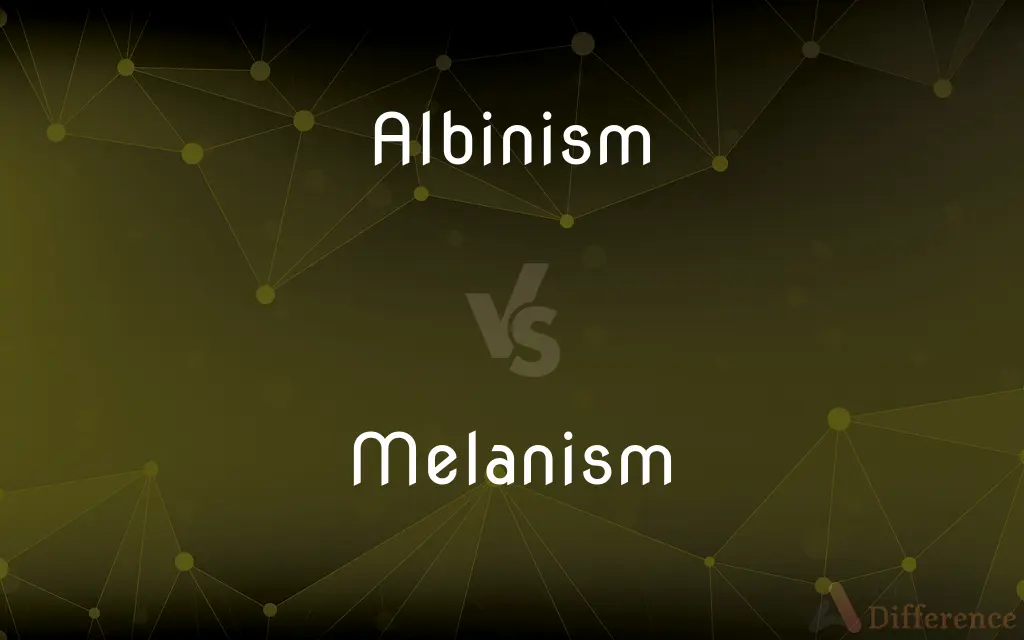Albinism vs. Melanism — What's the Difference?
By Tayyaba Rehman — Published on January 30, 2024
Albinism is a genetic condition causing a lack of melanin, resulting in white or pale skin and hair, while melanism is an overabundance of melanin, leading to dark pigmentation in skin, hair, or feathers.

Difference Between Albinism and Melanism
Table of Contents
ADVERTISEMENT
Key Differences
Albinism is a condition characterized by a lack of melanin pigment, which results in pale skin, white hair, and light-colored eyes. Melanism, in contrast, is marked by an excess of melanin, causing darker skin, hair, or feathers than typically seen in the species.
Individuals with albinism often experience sensitivity to sunlight and vision problems due to the absence of melanin in their eyes. Melanism, on the other hand, provides greater protection against ultraviolet radiation, often benefiting individuals in sunny environments.
Albinism is caused by mutations in genes related to melanin production and is inherited in an autosomal recessive manner. Melanism results from different genetic variations and can be an adaptive response to certain environmental conditions.
In wildlife, albinism is rare and can make animals more visible to predators and less successful in hunting, whereas melanism can be advantageous for camouflage or heat absorption, depending on the habitat.
Both albinism and melanism can occur in various species, including humans, mammals, birds, and reptiles, but each has distinct implications for the appearance and survival of the organism.
ADVERTISEMENT
Comparison Chart
Melanin Production
Absence or lack of melanin
Excess production of melanin
Physical Appearance
White or pale skin, hair, and light eyes
Dark skin, hair, feathers, or scales
Genetic Cause
Mutations in genes for melanin production
Variations often for adaptive pigmentation
Environmental Adaptation
Increased sensitivity to sunlight
Increased protection against UV radiation
Ecological Impact
Visibility to predators, vision issues
Camouflage, heat absorption advantages
Compare with Definitions
Albinism
Characterized by pale skin, white hair, and light-colored eyes.
Albinism is easily recognizable by its distinct physical characteristics.
Melanism
An increased amount of dark pigment, melanin, in the skin, hair, or feathers.
Melanism is responsible for the black panther's distinctive coloration.
Albinism
A genetic condition marked by the absence of melanin pigment in the body.
Individuals with albinism often need to take extra precautions in sunlight.
Melanism
Often provides advantages like camouflage or UV protection.
Melanism can offer survival benefits in certain environmental conditions.
Albinism
Caused by a mutation in one of several genes associated with melanin production.
Albinism results from inherited genetic factors affecting melanin.
Melanism
A genetic variation that results in darker pigmentation.
Melanism is a result of genetic factors influencing melanin production.
Albinism
Can affect all vertebrates, including humans, mammals, and birds.
Albinism is not limited to humans; it's also seen in animals.
Melanism
Found in various species, including insects, mammals, and birds.
Melanism is observed in different animal species, not just mammals.
Albinism
Associated with vision problems and sensitivity to light.
People with albinism often have visual impairments due to lack of eye pigment.
Melanism
Can occur as an adaptive trait in response to environmental factors.
Melanism in some species is an evolutionary response to their habitat.
Albinism
Any of several inherited conditions characterized by the reduction or absence of the pigment melanin in a person or animal, resulting in lack of pigmentation in the eyes, skin, and hair. Humans with albinism usually have vision problems.
Melanism
See melanosis.
Albinism
Lack of chlorophyll in a plant or plant part, resulting in a pale color.
Melanism
Dark coloration of the skin, hair, fur, or feathers because of a high concentration of melanin.
Albinism
Congenital lack of melanin pigmentation in the skin, eyes, and hair or feathers (or more rarely only in the eyes); the condition of being albino.
Melanism
Congenital excess of melanin pigmentation in the skin, hair, feathers and/or eyes.
Albinism
The state or condition of being an albino: abinoism; leucopathy.
Melanism
An undue development of dark-colored pigment in the skin or its appendages; - the opposite of albinism.
Albinism
The congenital absence of pigmentation in the eyes and skin and hair
Melanism
A disease; black jaundice. See Melæna.
Melanism
The character of having a high degree of pigmentation, as shown in dark skin, eyes, and hair.
Melanism
A condition characterized by abnormal deposits of melanin (especially in the skin)
Common Curiosities
Is melanism the same as being albino?
No, melanism involves excess melanin, while albinism is its absence.
What are the advantages of melanism?
It can provide camouflage and protection against UV radiation.
Can albinism affect vision?
Yes, it often leads to vision problems and sensitivity to light.
Do all albinos have red eyes?
Not necessarily; eye color can vary among individuals with albinism.
Does melanism occur in plants?
No, it's primarily a phenomenon in animals and humans.
What causes albinism?
Genetic mutations affecting melanin production lead to albinism.
How is albinism inherited?
It's usually inherited in an autosomal recessive pattern.
Can melanism be induced by environmental factors?
Yes, in some cases, it's an adaptive response to the environment.
Does melanism affect an animal's behavior?
It doesn't directly affect behavior but can influence survival strategies.
Are albino animals common in the wild?
They are rare and often have reduced survival rates.
How does melanism differ in animals compared to humans?
In animals, it often serves as camouflage; in humans, it's less common and not typically adaptive.
Can albinism be cured or treated?
There's no cure, but symptoms like vision problems can be managed.
Are people with albinism prone to skin problems?
Yes, they're more susceptible to sunburn and skin damage.
Can albinism occur in all races and ethnicities?
Yes, albinism can affect individuals of any race or ethnicity.
Is melanism hereditary?
Yes, it's often passed down genetically.
Share Your Discovery

Previous Comparison
Kanji vs. Katakana
Next Comparison
Ionic Mobility vs. Ionic VelocityAuthor Spotlight
Written by
Tayyaba RehmanTayyaba Rehman is a distinguished writer, currently serving as a primary contributor to askdifference.com. As a researcher in semantics and etymology, Tayyaba's passion for the complexity of languages and their distinctions has found a perfect home on the platform. Tayyaba delves into the intricacies of language, distinguishing between commonly confused words and phrases, thereby providing clarity for readers worldwide.












































